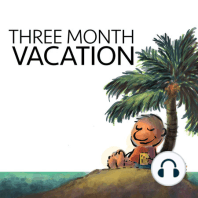21 min listen

How to Get Clients To Return To An Offline Event
How to Get Clients To Return To An Offline Event
ratings:
Length:
39 minutes
Released:
Oct 28, 2017
Format:
Podcast episode
Description
How do you get clients to return? One of the most underrated tactics is often right under your nose. Yet most people having events don't realise the mistake they're making and have to work a lot harder to get clients to come back. In this episode we look at what every business should do: not just get a client but get the client to come back repeatedly. Read online: How to Get Clients To Return To An Offline Event ============ If you head down to the South Island of New Zealand, you'll run into a little French town called Akaroa. The story goes all the way back to 1838 when the commander of the French whaling ship Cachalot what can only be called a slightly questionable purchase of the land around the area. Then, the French colonists left France to sail to New Zealand to establish a French colony. The French did get to Akaroa but found a treaty had been signed between the Māori and the British. The whole of New Zealand was officially a British colony. As the story goes, the French were just a wee bit late. The French seemingly missed out on yet another colony, and we can feel the impact of being late when it comes to testimonial-gathering as well. But why testimonials? Because testimonials are the lifeblood of any organisation, product or service. The more testimonials you have in place, the more the prospective client can experience your product or service, long before they pay for it. Which is why books have testimonials on their dust jackets, and websites have testimonials on every single product or service. But back to the concept of lateness If you wait long enough, the client is unlikely to give you a testimonial, simply because they've gotten too busy. It's also harder for the client to gush as much once they've moved on. 2) How and when to get testimonials Getting a testimonial for an event is almost as important as the event itself. For one, when a client gives a testimonial, they're ratifying they made the right decision to attend the event. However, it gives you, the person holding the event, a chance to make sure you never have to struggle to fill in seats in future. Which is why you should get testimonials during the breaks If you don't have breaks in your event, there's no way to stop the juggernaut from rolling on. At Psychotactics we have workshops, and for information-based events, it's critical to have many breaks or clients simply get more tired. If you're having an event like a cooking class or a watercolour class, something that's not usually break-oriented, it's easy to forget that every event could do with a break of some sort. People need to get to the toilet; they need just to step outside or reduce the intensity of what's happening. Most trainers or people hosting events fail to pay attention to the concept of breaks, merely because they think it will stop the flow of the event. What you'll quickly realise is that people regroup speedily and focus better after a short break. It gives you some downtime as the organiser, and it leaves some room should something go wrong during the event. If you simply go from one end to the other, you're not really planning for any chaos, and as we know, that's a hazardous strategy. Chaos can erupt from nowhere, and it's best to prepare for it in advance, by having at least one, if not several breaks. It's in this break that you're going to be able to get your testimonial Usually a client will be having a great time and will come and tell you so. It will quickly be evident as to who's having the most fun, and you can usually go up to them and ask if you can shoot a quick video. Be prepared to know in advance where you can shoot the video, ideally some places that are slightly quieter and away from the scene of action. I tend to use another room or another area close enough, but far away from the group. Ideally get 2-3 people to give testimonials, and in about 10 minutes, you can get about three quick testimonials that can be used in a video, audio, or when transcribed, i
Released:
Oct 28, 2017
Format:
Podcast episode
Titles in the series (100)
Why We Sell Less: The Root of Confidence: The hardest thing in business?or life is the factor of confidence. Whether you're in online marketing, selling products or services, or run a physical store, the confidence goes up and down. And yet, confidence is what creates sales. Sales, after all,... by The Three Month Vacation Podcast